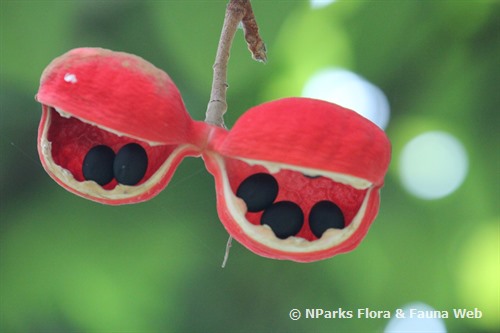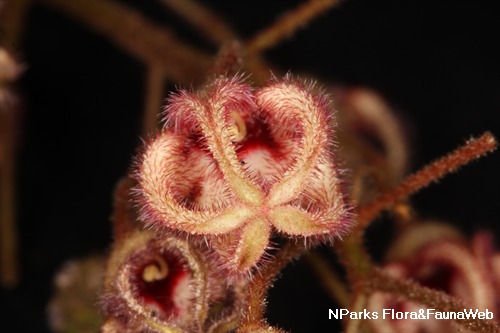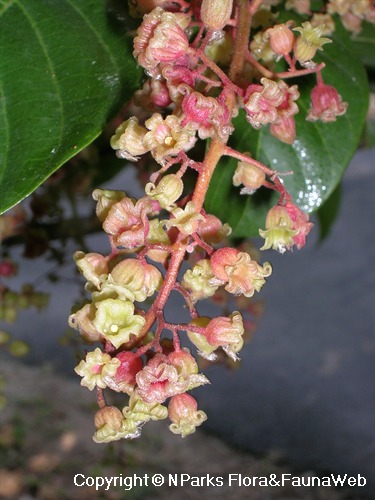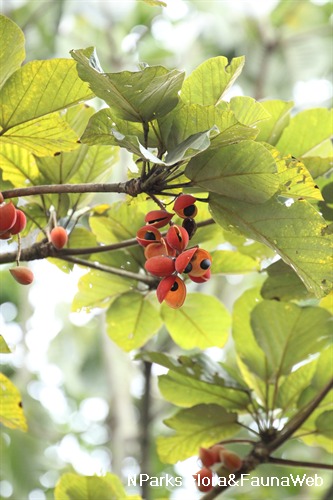
Back
Sterculia macrophylla Vent.
| Family Name: | Malvaceae |
| Common Name: | Broad-leaved Sterculia, Kelumpang, Melian |
Name
Classifications and Characteristics
| Plant Division | Angiosperms (Flowering Seed Plants) (Dicotyledon) |
|---|---|
| Plant Growth Form | Tree (Big (>30m)) |
| Lifespan (in Singapore) | Perennial |
| Mode of Nutrition | Autotrophic |
| Plant Shape | Tiered |
| Maximum Height | 40 m |
Biogeography
| Native Distribution | Thailand, Malaysia, Singapore, the Philippines, Indonesia, and Papua New Guinea |
|---|---|
| Native Habitat | Terrestrial (Primary Rainforest, Secondary Rainforest, Freshwater Swamp Forest) |
| Preferred Climate Zone | Tropical |
| Local Conservation Status | Native to Singapore (Critically Endangered (CR)) |
Description and Ethnobotany
| Growth Form | It is a big, pagoda-shaped tree that can grow up to 40 m tall, with buttress root up to 3 m tall, and will shed its leaves annually. |
|---|---|
| Trunk | Straight, tall trunk has light grey, smooth bark. |
| Foliage | Its spirally arranged, stalked leaves have papery to leathery leaf blades that are densely softly hairy below, broad-egg-shaped to heart-shaped, 12–40 by 10–35 cm, with 6–10 pairs of side veins, and prominent venation underneath. Young leaves are palmately lobed, reddish and densely hairy. |
| Flowers | The plant is monoecious, producing both unisexual and bisexual flowers. The tiny flowers are about 0.5 cm across, greenish-yellow or red, and occur on many-flowered flowering clusters that are 15–40 cm long. |
| Fruit | Its fruit is a seed-pod (follicle) that will split open along a single side when dry. 1–5 follicles occur in a cluster. Each follicle is round or ellipsoid, 3.5–6 by 2.5–5 cm, red to dark brown, velvety, and contains 1–9 seeds. Each seed is black, ellipsoid, and about 12–20 by 8–12 mm. |
| Habitat | It grows in both primary and secondary lowland forest, and swamp forest, up to 900 m altitude. In Singapore, it can be found in Nee Soon Swamp Forest. |
| Associated Fauna | Its flowers are pollinated by insects. Seeds can be eaten by squirrels, and are probably dispersed by birds. |
| Cultivation | It can be propagated by seed. |
| Etymology | Latin stercus (derived from Greek Sterculius, god of fertilization), dung, referring to the smell of flowers; Greek macrophylla, large leaf, referring to the species’ large leaf blades |
| Ethnobotanical Uses | Medicinal: The seeds are said to possess medicinal properties. Timber & Products: It is harvested for timber to be used for planking or making canoes. |
Landscaping Features
| Landscaping | The tree is suitable for cultivation in parks and is able to tolerate roadside conditions. It is also able to withstand waterlogged soils. The plant has an attractive tiered shape crown, spectacular pink inflorescences and stunning red fruits. |
|---|---|
| Desirable Plant Features | Ornamental Flowers, Ornamental Fruits, Ornamental Form |
| Landscape Uses | General, Suitable for Roadsides, Parks & Gardens, Small Gardens, Riverine, Pond / Lake / River, Marsh / Bog, Shade Providing Tree / Palm, Focal Plant |
| Thematic Landscaping | Naturalistic Garden, Water Garden, Marsh Garden |
Fauna, Pollination and Dispersal
| Fauna Pollination Dispersal Associated Fauna | Bird-Attracting Plant |
|---|---|
| Pollination Method(s) | Biotic (Fauna) |
| Seed or Spore Dispersal | Biotic (Fauna) |
Plant Care and Propagation
| Light Preference | Full Sun |
|---|---|
| Water Preference | Moderate Water, Lots of Water |
| Plant Growth Rate | Moderate |
| Rootzone Tolerance | Moist Soils, Waterlogged Soils (Drains Site, Does not Drain Site), Well-Drained Soils, Fertile Loamy Soils |
Foliar
| Foliage Retention | Deciduous |
|---|---|
| Mature Foliage Colour(s) | Green |
| Mature Foliage Texture(s) | Velvety / Furry / Tomentose, Papery, Leathery |
| Prominent Young Flush Colour(s) | Red |
| Young Flush Texture(s) | Velvety / Furry / Tomentose |
| Foliar Type | Simple / Unifoliate |
| Foliar Arrangement Along Stem | Alternate |
| Foliar Attachment to Stem | Petiolate |
| Foliar Shape(s) | Non-Palm Foliage (Ovate, Cordate) |
| Foliar Venation | Pinnate / Net |
| Foliar Margin | Entire |
| Leaf Area Index (LAI) for Green Plot Ratio | 3.0 (Tree - Intermediate Canopy) |
Floral (Angiosperm)
| Flower & Plant Sexuality | Unisexual & Bisexual Flowers(Sub-dioecious) |
| Flower Colour(s) | Yellow / Golden, Pink |
|---|---|
| Flower Grouping | Cluster / Inflorescence |
| Flower Location | Axillary |
Fruit, Seed and Spore
| Mature Fruit Colour(s) | Orange, Red |
|---|---|
| Fruit Classification | Simple Fruit |
| Fruit Type | Dehiscent Dry Fruit , Follicle |
Image Repository
Others
| Master ID | 1845 |
|---|---|
| Species ID | 3138 |
| Flora Disclaimer | The information in this website has been compiled from reliable sources, such as reference works on medicinal plants. It is not a substitute for medical advice or treatment and NParks does not purport to provide any medical advice. Readers should always consult his/her physician before using or consuming a plant for medicinal purposes. |

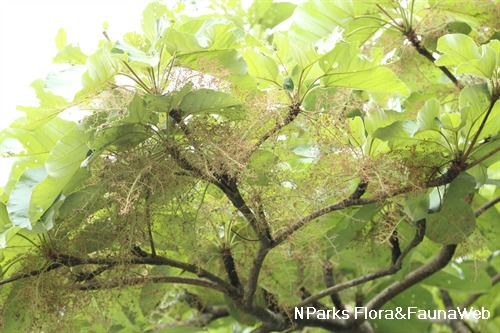
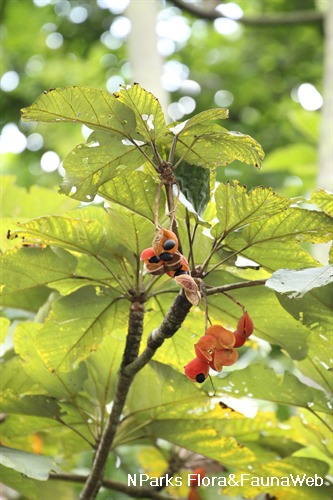
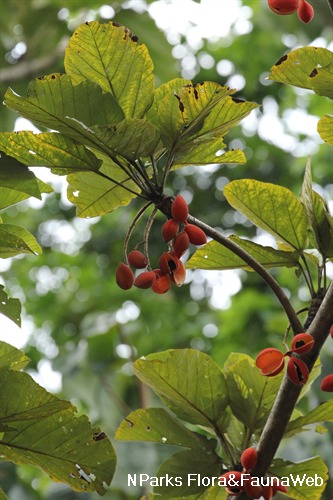
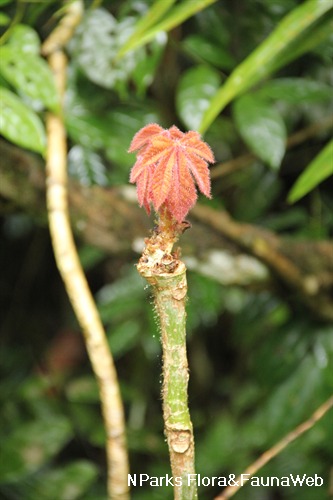
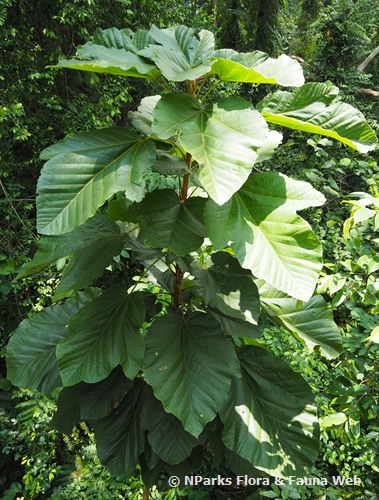
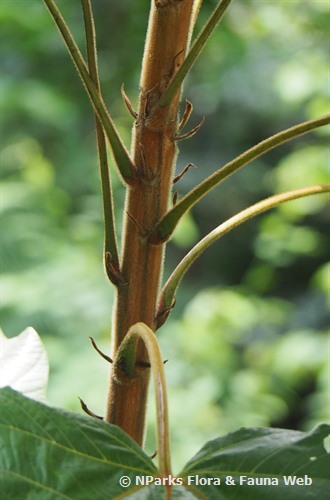
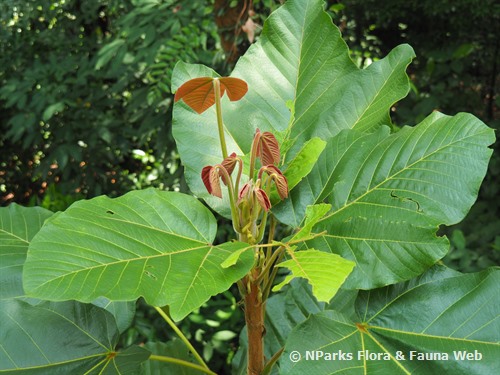
_lowres.jpg)
